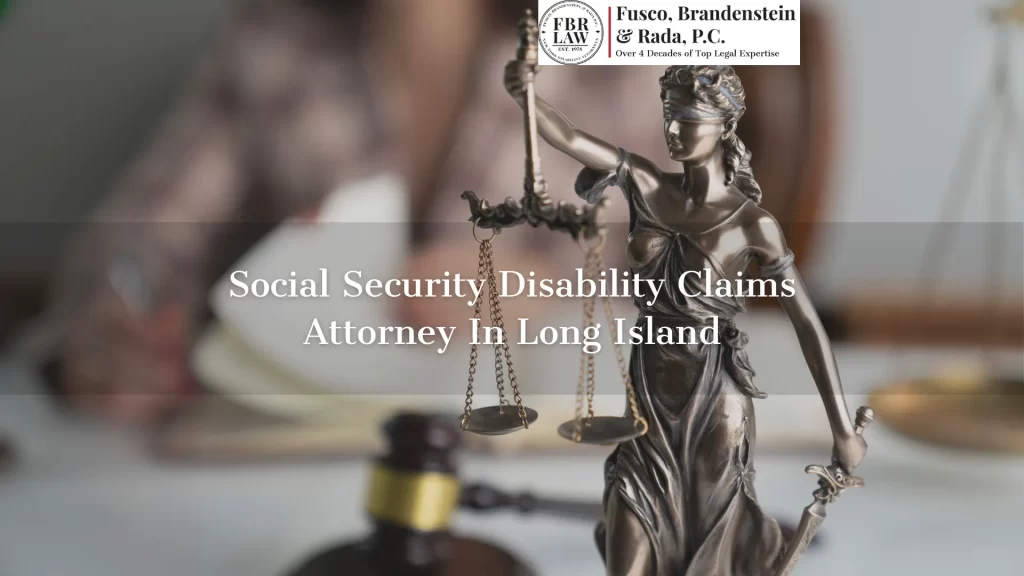
Are you disabled and unable to work? Don’t worry! There are legal options available to ensure that you get the medical care that you need. The Long Island disability lawyers at Fusco, Brandenstein & Rada, P.C. have extensive experience in federal disability law and can lead you through the claims process with a minimum amount of hassle. If your claim is denied, we can help guide you through the appeals process. Call us as soon as possible at 516-496-0400 for a free consultation.
Why You Need A Long Island Social Security Disability Lawyer
The Social Security disability claims process is complex and difficult to navigate, and having a skilled attorney on your side can greatly increase your chance of a successful outcome. There are many requirements involved in making a claim for benefits, including meeting deadlines as well as providing detailed medical records documenting your condition. It is very easy to miss an essential piece of evidence or a mandatory due date, which can cause your claim to be denied. If your claim is denied, your attorney can help you through the appeals process. An experienced disability lawyer is essential to a successful claim.
Why Hire Fusco, Brandenstein & Rada, P.C.?
The highly skilled attorneys at Fusco, Brandenstein & Rada, P.C. specialize in Social Security disability and workers’ compensation claims. We take pride in helping people who are injured and facing a difficult recovery. We serve clients in Long Island and in ten offices throughout New York. Our firm has helped thousands of New Yorkers facing difficult circumstances for over four decades. We can help you, too. Call us at 516-496-0400 today.
The Social Security Disability Claims Process
In evaluating your application for Social Security disability benefits, the Social Security Administration (SSA) puts your claim through a five-step process to determine the severity of your condition and your ability to earn a living.
- Your Current Employment Status – The SSA checks to see whether you are engaged in “substantial gainful activity.” If you’re earning a certain amount per month ($1,310 as of 2021), you are considered able to be gainfully employed and won’t be eligible for benefits, even with a qualifying condition. If you can’t work or you bring home less than this amount, your application can proceed.
- The Severity Of Your Condition – A claims examiner assigned to your case evaluates your impairment and determines its severity. Your illness may receive a rating ranging from “not severe” to “incapacitating.” The examiner reviews how much your condition limits your ability to work and what steps may be needed to improve your ability to function. If medication or a corrective device will allow you to return to work, your condition may be rated as less severe. If your condition seriously limits your ability to move or function mentally, your illness would receive a higher rating.
- Your Impairment – The examiner will check your condition and its severity against the Listing of Impairments to determine whether your level of severity will allow you to work. The list contains the most common conditions and how severe they must be to prevent a patient from returning to work. If your condition matches the list, you will most likely qualify for benefits. If your impairment isn’t listed, the examiner searches for a condition similar to yours or with a similar severity. You may qualify at this step, or your case may require further review.
- Your Ability To Do Your Previous Job – If your illness doesn’t match any of the listed conditions, the examiner may still determine that your impairment is too severe to allow you to function at work. They will review your “residual functional capacity” or how much ability you still have to work despite your injury.
- Ability To Perform Other Employment – If the SSA determines that you are unable to perform your previous job, they will consider whether you can do another job that is less physically or mentally demanding. They may deny your claim on the basis that you are capable of finding other employment. If you are older, it’s understood that you will have more difficulty learning and adjusting to a different type of work, and this consideration could have a positive impact on the decision to approve you for benefits.
As you can see, there are many decisions that must be made during this process, and an inaccurate determination of your medical status can cost you access to essential benefits. It’s incredibly important to consult with an attorney who is knowledgeable about the entire claims process and all the details involved.
Types of Disabilities That Qualify For Social Security Disability Insurance
The federal government provides benefits to people with long-term and debilitating injuries and conditions that prevent them from working and supporting themselves. The types of illnesses these benefits will cover include a variety of major illnesses, including cancer, loss of hearing and/or vision, as well as mental conditions such as depression, PTSD, and cerebral palsy. The Social Security Administration’s Blue Book lists all the qualifying conditions. They include:
- Heart conditions such as high blood pressure and heart disease
- Gastrointestinal disorders such as diverticulitis, kidney disease, and stomach ulcers
- Immune system diseases, including Lupus, Epstein-Barr, and psoriasis
- Mental conditions, such as post-traumatic stress disorder, schizophrenia, and depression
- Musculoskeletal problems such as herniated discs, spinal cord injuries, and osteoarthritis
- Neurological disorders, like Tourette’s, Parkinson’s, and chronic migraines
- Respiratory diseases such as emphysema and pneumonia
- Cancers, such as brain cancer, liver cancer, thyroid cancer, pancreatic cancer, and breast cancer, among others.
This is just a partial list of conditions that may make you eligible to receive Social Security disability benefits. You should check with your attorney about your particular health issues and whether they qualify.
Social Security Disability Frequently Asked Questions
 If you’re looking for answers about your claim, an experienced disability attorney is the best source for information. Here are a few common questions about Social Security disability claims.
If you’re looking for answers about your claim, an experienced disability attorney is the best source for information. Here are a few common questions about Social Security disability claims.
How Long Will It Take To Approve Or Deny My Claim?
The length of time can vary depending on where your application is in the approval process. The decision on an initial claim can often take from three to four months. If your claim was denied and you file an appeal, the reconsideration process may also take about three or four months. If your case requires a hearing before an administrative law judge, you may have longer to wait—up to two years. An appeals council, the next step, could take up to a year. Finally, an appeal in federal district court may keep you waiting another year or longer.
What If My Claim Is Denied?
A claim may be denied for a variety of reasons. Lack of sufficient evidence of your disability or of the severity of your injuries is a common problem. Even if your claim is denied, however, there are still options to explore. Whether it’s because they don’t know they can, or they don’t know how, many applicants choose not to appeal, or they file a new claim unnecessarily. This is usually a mistake. Filing an appeal is much more likely to succeed. Our experts can guide you through the appeal process with the best possible chances for success. You need to get started right away though. There is a 60-day deadline; that time will be necessary to address the issues with your claim that triggered the denial.
How Are My Benefits Calculated?
If you are approved, the amount of your monthly benefits will be based on your average lifetime earnings from before you became impaired. If you receive benefits from other sources or you are still working, your Social Security Disability Insurance (SSDI) monthly benefits will be reduced. The wages you earned while paying into the Social Security program throughout your lifetime will count towards your SSDI benefits. The average of your earnings over a certain number of years will factor into your AIME score, or your Average Indexed Monthly Earnings. The higher your AIME, the higher your monthly benefits will likely be. Other public disability benefits, such as workers’ compensation, temporary state disability benefits, or certain military benefits may be considered in order to reduce your SSDI benefits. If your monthly benefits from all applicable sources is higher than 80 percent of your average earnings from before you became disabled, your monthly SSDI benefits will be reduced.
Talk To A Social Security Disability Specialist Right Away
The SSDI lawyers at Fusco, Brandenstein & Rada, P.C. are used to taking on the toughest disability cases. We help New Yorkers facing lifelong illnesses every day get the benefits they need to make their lives whole again. You deserve top-quality, experienced legal representation to handle your claim.
Recovering from a long-term illness or debilitating condition is difficult and painful, and worrying about lost time at work just adds to the stress. You need an experienced advocate by your side who can cut through all the paperwork and details to help you take care of your health and get your life back on track. Call us at 516-496-0400 or fill out our contact form today to get started.
